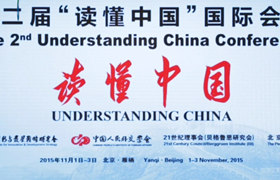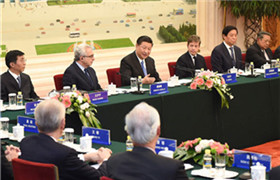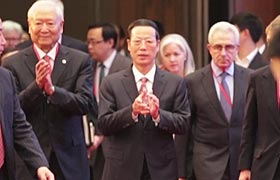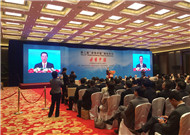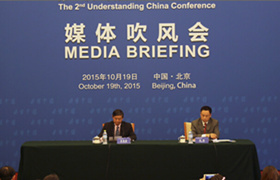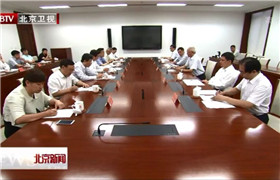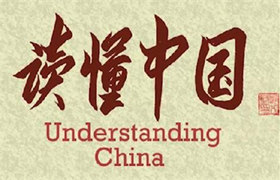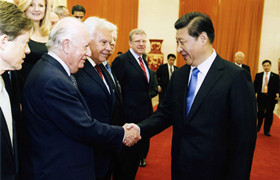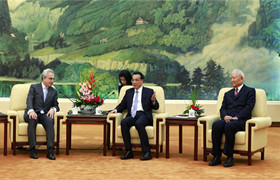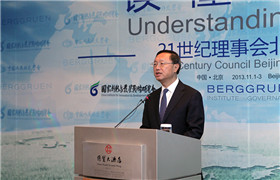- HOME--> Chairman
-
China’s New Opportunities for Peaceful Development in the Digital Era
Source:People’s Daily
China’s New Opportunities for Peaceful Development in the Digital Era[1]
Zheng Bijian[2]
Looking around us and around the world, we identify two trends that dominate our times. One is peace and development for mutual benefits and the other is Internetization[3] epitomized by the use of information technologies and intelligent, digital technologies.
Internet information technologies develop apace and pervade all aspects of the human society, therefore having profound economic, social, and security implications globally. As a matter of fact, all the major countries of the world are tapping into the power of Internet technologies in enhancing their competitive advantages. That is, the Internet is much more than an advanced modern technology and platform; it is going strategic.
These two trends are not strangers to each other nor do they develop in parallel; rather, they are interconnected and mutually reinforce and promote each other. The Internet is of particular strategic importance for a peacefully rising China.
China’s complacency and self-seclusion had cost itself numerous rare opportunities for development during the days of the Industrial Revolution. However, since the implementation of reform and opening up, the nation has been going step by step with the rest of the world in riding the wave of the Internet.
In the intervening years between now and mid-21st century, as economic globalization moves forward following a zigzag course, a major characteristic of the development of the world will be that of a new round of technological revolution and institutional innovation employing Internet technologies. As a result, productive forces, national defense, and cultural strength are expected to experience significant improvements. This is the trend of the times, under which China is blessed with new opportunities for development as it pursues peaceful rise.
My conclusion is that we are amidst an unprecedented wave of Internetization. Riding the wave, China is moving forward on the road of peaceful rise more determinedly and confidently than ever. These are irresistible trends!
The Call for a “New Civilization” in the Digital Age
We consider Internetization and world peace and development and cooperation for mutual benefits as interrelated trends of our times; in China, we associate its development of Internet technologies with its pursuit of peaceful rise. Along these lines of thinking, we foresee that we should be able to see the awakening of a new civilization made possible by the powerful forces of Internetization.
The awakening of the new civilization is first defined in terms of productive forces. From Industrial Revolution to Information Revolution, productive forces and mode of production are shifting from mass production to customized production, and the focus of the value chain is moving from manufacturing to big data and information content. The Internet is a seemingly inexhaustible source of data, and these data have unlimited potential for value creation. The Internet and big data technologies promote the development of productive forces such that there are untold possibilities for the creation of new value and wealth for humanity. The virtual space is distinguished from the physical space essentially because in the former data can be repeatedly utilized and information can be shared more easily; hence humanity can leverage it to reach higher or new levels of civilization. The emergence of new productive forces and ways of production in the Internet age make it possible for the development of relations among different countries that can be described as non-zero-sum and the building of communities of common interests.
Secondly, the awakening of a new civilization is also defined in terms of national security. Information technologies promote the development of information weapons, whose power lies in controlling the release of energy, and thus provide a strategic vantage point in warfare and national defense operations. As the Internet space is considered as belonging to a fifth-dimensional space, security threats within the Internet space are now elevated to first-level security threats for sovereign nations. The massive Internet outrage that occurred in October 2016 in the United States was a major attack and seriously affected the lives of many people. The global security threat incidents that we know so well show that Internet threats, unlike countries, know no borders. No single country can expect to go unscathed in the Internet space. All major countries are responsible for developing Internet-based national defense capabilities and building up new-type defense systems while engaging in international cooperation and safeguarding world peace and development in the Internet space.
Thirdly, the awakening of a new civilization is defined in terms of cultural strength. The Internet inspires and enlightens the people and, in so doing, enhances their quality and capabilities. An average person has access to vast amounts of information on the Internet, which were unconceivable anytime in pre-Internet human history. The new media, We Media, and Cyberspeak (with idiosyncratic typographical symbols, such as emoticons), which are disseminated in fragments, have such an enormous impact on the netizens, especially the young, that we may liken these to the Baihua Literary Movement[4] one hundred years ago. Also, given its global reach, Cyberspeak provides a rare opportunity for the Chinese to communicate with the rest of the world and keep in touch with the times. A number of Internet-based cultural enterprises have sprung up across the nation. Cross-cultural communication through the Internet has an immense role to play in the digital age.
In the final analysis, it is the people, especially the young, that make each of the above happen. Today’s young netizens have grown up being immersed in the influence of the Internet; active and thriving in the virtual space, they are what we call “new youth” as they are more venturesome and entrepreneurial. They constitute the most active and productive part of the workforce engaged in industrial and agricultural production, scientific research, education, cultural enterprises, innovation, Internet industries, and so on. In approximately another 20 years, they will move to be the leading force of the various endeavors.
In a word, the Internet has led us to an entirely new age in human history. As citizens in the so-called “global village”, we share weal and woe and our fates are closely linked together. A new age awakens us to the need for reaching a new civilization, and a new space makes this possible. While this civilization is in the making, productive forces, national defense, and cultural forces reinforce and integrate each other through the Internet and under certain conditions. Miracles unheard of in human history are created in the process.
Every Coin has Two Sides
Laozi, ancient Chinese philosopher and founder of Daoism, believed that there are two sides to everything in the world. This transcendental insight has been emphasized over the centuries.
While human progress in the Internet era has been unprecedented, problems that have arisen have been unprecedented, too.
While the Internet has given rise to a plethora of new industries and business formats, it has undermine many traditional ones, prompting an argument for its controversial role. While the Internet has helped many people rid themselves of poverty through sharing of information resources, the “digital divide” is said to have widened the gap between rich and poor. While the Internet channel has provided vast opportunities for communication and cultural exchanges across the world, its effects on social unrest have become a focus of attention. The human society has benefitted enormously from the Internet in terms of wealth and the quality of human beings; at the same time, however, it is now susceptible to crises more frequently and also new forms of crisis. Finally, with the Internet, the different countries in the world have substantially expanded the scope of competition for and control of resources from land and energy to information resources and their operations.
The two-sidedness of Internetization cannot be overlooked in the development of productive forces, national defense, and cultural strength in the digital age. Actually, the issues of cyber sovereignty and governance of the virtual world have been raised and received much attention.
Ahead of us are two divergent roads to choose from in the digital era. One is that of building a community of shared interests in the Internet space as advocated by China. G20 Digital Economy Development and Cooperation Initiative precisely echoes the consensus, prevailing trends, and common wishes and needs of both China and other countries in the world. For example, all countries are making blueprints for their digital future. These include, among others, the following: China’s “Made in China 2025” initiative, the U.S.’s Industrial Internet Consortium, Germany’s Industry 4.0, the UK’s Digital Economy Strategy, Japan’s Super Smart Society Plan (Society 5.0), and South Korea’s Innovation in Manufacturing 3.0 Strategy. The other, in contrast, is that of making the Internet space the playground for hegemony.
Which road should we take amid the dramatic changes in today’s world? This boils down to the question of whether we should follow or go against the times and demand an answer from the people in the world, especially the leading figures in various fields.
China’s Propositions shall Benefit All
The Chinese view the two-sidedness of Internetization realistically and sober-mindedly, and their positions on this are clear-cut.
We are remarkably receptive to new things. As of June 2016, the number of netizens in China topped 710 million. Internet retails in 2015 amounted to 3,800 billion yuan (more than $558 billion), or 12.7% of total retail sales of consumer goods, ranking the first in the world; information economy accounted for more than a quarter of the country’s GDP in the same year.
Nevertheless, we are aware of where we fall short of our expectations. Particularly, there is the problem of inefficient data interconnectivity, which is having its bottleneck effects. Also, it is imperative that we improve innovation levels. Therefore, we need to make unremitting efforts toward turning China into an Internet power, which include the following: accelerate the pace of innovation in Internet information technologies, and further strengthen the role of the digital economy in promoting economic development; strengthen Internet governance and Internet security capabilities, and speed up social governance by using Internet information technologies; and increase China’s rights to participate in international dialogs on the Internet and the formulation of rules and regulations governing the Internet.
In the Chinese philosophy, “to back out in the face of difficulty is cowardice, and to rise to difficult challenge is bravery”. Where there is will, there is a way; where there is a way, there is hope. The Chinese government aims high and can accomplish big things in a short time, and this is our huge advantage.
To achieve the set goals, we need to properly handle a number of complex relations existing in the Internet space, which include the following: freedom vs. order; development vs. security; openness vs. independence; and service vs. governance.
China speaks boldly and confidently on cyber sovereignty and its maintenance precisely because there exist Internet hegemony in violation of the spirit of the Internet, cyber terrorism that threatens global peace and security, as well as cyber violence and pornography and other unethical cyber behaviors.
Also, there are other reasons why China stands for safeguarding cyber sovereignty. Cyber sovereignty is not absolutely exclusive; thus, sovereign states can cooperate for mutual benefits. In fact, safeguarding cyber sovereignty serves the purpose of better achieving such cooperation. On the other hand, doing so is conducive to protecting the collective human rights of the people of a nation. All countries which had been subjected to colonial rule are aware that individual human rights cannot be guaranteed absent collective human rights. Hence, safeguarding a country’s sovereignty in the Internet space is the precondition for realizing the individual citizens’ human rights in such space. China has introduced an Internet security law designed to safeguard its cyber sovereignty and protect the human rights of its citizens in the Internet space.
To truly ensure that the spirit of the Internet prevails in the present world, it is essential that we seek to maximize the benefits of the international community in the cyber space from the perspective of building a community of shared interests in such space and by aiming at mutually beneficial cooperation and resistance of cyber hegemony. In doing so, it is important that we approach cyber sovereignty from international, national, and individual perspectives.
These positions reflect China’s consistent stand on peaceful rise—peaceful rise with the Internet as an underlying driving force. We adhere to these stands not for selfish motives or cyber control but for the ultimate goals of peaceful use and sharing of Internet resources.
Let’s open our arms to embrace a new Chinese civilization and a new civilization for humanity that are arising in the Internet age. Let’s join hands in building a cyber community of shared interests for a more peaceful and beautiful future. We in China do so through peaceful rise and innovation that benefit the whole humanity.
-
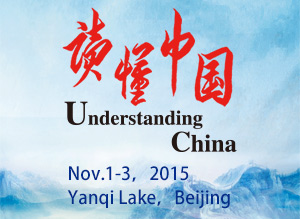
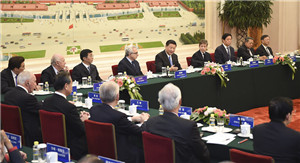
The 2nd "Understanding China" ConferenceOn November 1~3, 2015, the 2nd “Understanding China” Conference was held in Beijing Yanqi Lake International Conference Center. Zhang Gaoli, Vice Premier of the State Council, attended the opening ceremony.
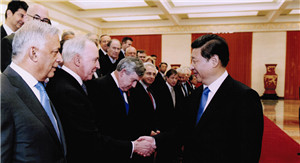
The 1st "Understanding China" ConferenceOn November 1~3, 2013, the 1st “Understanding China” Conference was held in Beijing, which was cosponsored by China Institute for Innovation & Development Strategy (CIIDS), Chinese People’s Institute of Foreign Affairs (CPIFA), and Berggruen Institute on Governance.
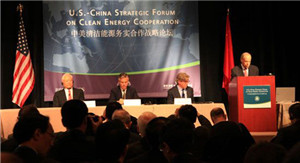
The 2nd U.S.-China Strategic Forum on Clean Energy CooperationWith the “Prospects for U.S.-China strategic cooperation in next decade” as its theme, the forum dwells on the implications of U.S.-China cooperation from the strategic perspective of coping with global challenges and maintaining world peace.
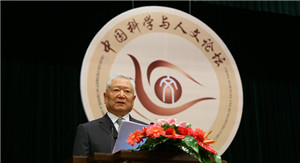
The China Sciences and Humanities ForumCo-initiated in April 2003 by renowned Chinese scientist Mr. Lu Yongxiang and influential political strategist Zhen Bijian, China Sciences and Humanities Forum was jointly hosted by Graduate University of Chinese Academy of Sciences (GUCAS) and the Higher Education Press.
-

